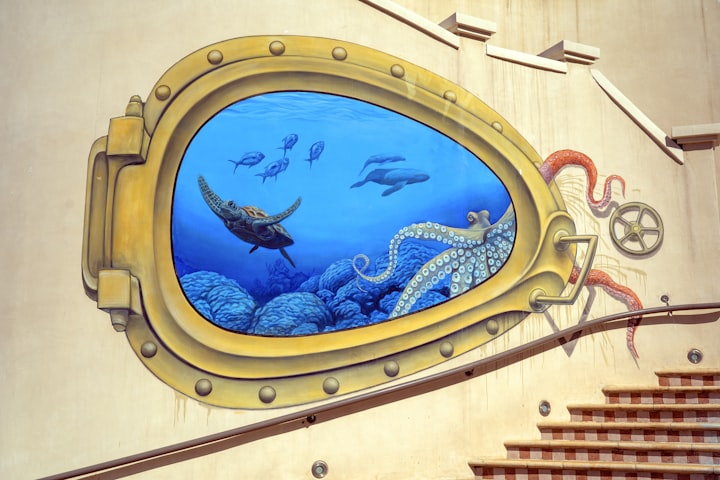Zale and Ula
The life of an octopus told by a Sea turtle

Zale and Ula were both filled with nerves and excitement for it was their first time attending school. They were eagerly anticipating this moment, despite knowing that they would be the only students without their parents to see them off. Like many cephalopods, they came to be orphans.
Thie is because of the octopus mothers incredible commitment to their offspring. Their motherly responsibilities go before everything else, even eating. The female octopuses' selflessness is incredibly heartwarming.
Zale and Ula’s mom, Kai, sacrificed her life to protect them and their 200,000 siblings. She spent ten months in her home, blowing currents over her eggs. This not only gave the embryos enough oxygen, but also kept any animals away that might want to harm them.
When octopuses reproduce, many of the young are eaten by predators. This is because the female is too vulnerable at that point to shield them. Upon hatching, her body begins a cellular self-decomposition process. It initiates with the optic glands and then spreads throughout her tissues and organs until she eventually passes.
Kai had ensured that her babies would have a fighting chance, and surprisingly, she lived long enough to witness Zale and Ula hatch. Despite the abundance of eggs, Zale and Ula were the only fortunate ones who made it through. Kai was resolute in showing them how much she loved them.
Though their time was limited, she shared as much knowledge as she was able to. One of the valuable lessons their mother passed on was to stay in the plankton clouds until they progressed beyond their larvae stage. Once they became octopuses, it was crucial for their health to stay submerged in the depths of the water since there were few corals to hide in. In her short life she had witnessed the slow disappearance of the coral reefs and the devastating consequences it had on the marine life. With each passing day, Kai's heart grew heavier, burdened by the weight of what the future held for Zale and Ula.
She told them stories she had heard from sea turtles and whales of how beautiful the reefs once were. The ocean was a vibrant and thriving place. Schools of colorful fish swam among the majestic coral reefs, and a symphony of marine life filled the waters.
During her final conversation with her children, Kai revealed the significance of their names. The meaning of Zale is oceanic strength, while Ula represents the jewel of the sea.
The evening their mother passed away, Zale and Ula looked up at the stars in the night sky, knowing she was watching over them. She’d be proud of all the things they were about to learn and discover. It was up to Zale to learn to adapt to the ways of the ocean. They desired their mother’s closeness. Although scared, Zale was also excited to take his sister on the journey they were about to embark on.
Zale was adventurous, and found himself wanting to stop the tragedy of pollution. It was on the same day they transformed into octopuses when they met Nun. Nun was a killer whale who dedicated her time to help find orphans. She ran an orphanage that was situated in the remaining part of the coral reef. She tried to maintain a positive mindset, believing it was a good thing that there were fewer orphans in the sea. Still, this was mostly due to the decline of the aquatic ecosystems, which are critical for the spawning of different fish species.
The pollution also made it difficult for other cephalopods and marine creatures to find safe hiding places. Also, plastic debris injures fish when they are caught in it, and animals mistake things like plastic bags for food causing them harm. Plastic debris in the oceans has shown that it can carry many bacteria, including some pathogens that cause coral disease. The microplastic pollution works its way up the food chain and ends up being consumed by all marine life.
The swift destruction of coral reefs and shells forced Zale and Ula to seek refuge in broken glass bottles. As they swam through a cloud of plankton making their descent through the somber depths, Zale and Ula encountered countless obstacles. The once-vibrant coral reefs had turned into crumbling graveyards, leaving them with a heavy heart. But they pressed on, fueled by a deep love for their oceanic home.
Nun stopped them to inquire about the whereabouts of their parents. When Zale explained they were orphans Nun insisted Zale and Ula come with her.
Zale and Ula found everything in Nun. She showed great kindness by providing shelter and nurturing care for the two siblings. Bedtime stories from picture books and school were part of their daily routine, thanks to her.
School is where I first met my best friend Zale and his sister, Ula. Our classroom had an unusual teacher, Mrs. Salmon, who was a hammerhead shark and we were eagerly awaiting her arrival.
Two species with big, floppy ears on their heads caught the attention of my friends and me. My squid friend Squishy and I (Scooter) were curious and a little uneasy.
In a condescending matter, Squishy inquired about the whereabouts of Zale’s parents, asking “ Where are your mom and dad?" Zale revealed that they were orphans.
Eager to hear Zale’s responses, more curious students gathered around as Squishy's questions continued. Interrupting before Zale could answer the last question, I interjected and asked about the peculiar appearance of their “big ears”. Zale Clarified that these were not ears, but rather fins on their heads. He explained that these fins, resembling elephant ears, had earned them the nickname “Dumbo octopus” from the land-lubbers.
This raised another question from a dolphin named Finley, who was unfamiliar with the concept of an elephant. Zale admitted to not knowing enough about the topic and expressed wanting to learn more to fully comprehend the comparison being made.
At that moment, Mrs. Salmon came in requesting that our classroom take our seats.
Mrs. Salmon welcomed the two new students to the class. “Zale and Ula, could you give us a brief introduction of yourselves?”
“Hello, I’m Zale.” He began: “My sister Ula and I are two months old. A few of you inquired about our parents’ whereabouts. The truth is, we never met our father. He died a couple of days after mating with our mother. When we were a week old, our mother said her last goodbye to both of us. The two people who brought us into this world, Oliver and Kai, loved each other deeply.”
Ula stood by Zale, bearing a face that resembled his.
“That’s very sad,” spoke Chariot, a seahorse of pink and yellow color.
“Is it true that your species has a five-year life expectancy?” A starfish named Nova Sterling asked.
"Yes, but according to land-lubbers, my species is among the most intelligent," Zale explained. “They discovered that the oldest known octopus fossil is from an animal that existed approximately 296 million years ago, during the Carboniferous period. To survive in the depths of the ocean, we developed a unique type of blood called hemocyanin. This adaptation allows our blood to transport oxygen in icy waters with low oxygen levels. Our preference for crawling is explained by the fact that our hearts stop beating when an octopus swims.”
Ula expressed anxiety as she reminded Zale of his promise to let her read her poem.
“You're right, Ula. The floor is yours.”
Ula's pride shone through as she shared a poem she wrote to help the class understand octopuses better.
This is a poem of an octopus tale
Written by me and my twin brother Zale
My brother tells me that I am such a pest
Claiming my mouth never gives it a rest
Our species is known as a cephalopod
Like our anatomy that names very odd
All this stuff’s strange so don’t be alarmed
Now I will tell you about all our eight-arms
A trick often used to not become prey
We sacrifice an arm then hurry away
The arm that we use will grow back again
I think that's because each arm has a brain
The tentacle rumor I have to address
Suckers are what our eight arms possess
Three hearts are beating inside our head
Blue is our blood; not the color red
Two hearts pump copper and one oxygen
Our preference is crawling rather than swim
I wish that my fins would turn into feet
When water's too cold our hearts stop their beats
We have a sharp beak to help kill our prey
We hunt during the night and sleep all-day
We don’t have ears so we’ve never heard sound
Our eyes keep us blinded from the color around
Our skin is how we hear, taste, and see
Changing its texture with what touches me
When we feel threatened, it’s black ink we spray
And us tasting good. That’s gross and cliche
We live primarily to mate and to breed
Planting our 400,000 octopus seeds
Our life of five years isn't really that long
But our octopus legacy forever stays strong”
Zale, Ula, Squishy, Finley, Nova, Chariot, and I, Scooter, formed a close group of friends after that significant day. Zale and I were inseparable as best friends, working together to restore coral reefs and protect our oceans. We were the marine creatures who were fortunate enough to escape the clutches of plastic waste. Together, we formed an alliance called "The Guardians of the Sea." We traveled far and wide, reaching out to humans and making them aware of the dire consequences their actions had on marine life. And we embarked on a perilous quest to restore balance and heal our suffering home.
I had the privilege of spending five short years with my wonderful friends, Zale and Ula, before they passed away. Ula, while laying and guarding her eggs, was aided by an environmentalist who fed her until her offspring hatched. The aim was to help octopuses evolve and live longer. Unfortunately, like her mother, Ula passed away shortly after their hatching.
Zale died just two days after finding a mate. The remaining members of our group got married and lived lives that would have made Zale and Ula proud. Regarding myself, Scooter, well, I am a sea turtle and have a life expectancy of up to 150 years. Having lived for 60 years, I have met the children, grandchildren, and numerous generations beyond that of Zale and Ula. While I’m alive, I can promise that their family will always have a home.
My goal is to honor Zale and Ula by continuing their work of raising awareness about the negative impacts of ocean pollution and reef destruction. The importance of love, friendship, and family, and most importantly, how incredible octopus parents are.
About the Creator
Elisa Green
I have a deep passion for writing, and upon completing a poem or story, I experience an immense sense of satisfaction and fulfillment.






Comments
There are no comments for this story
Be the first to respond and start the conversation.